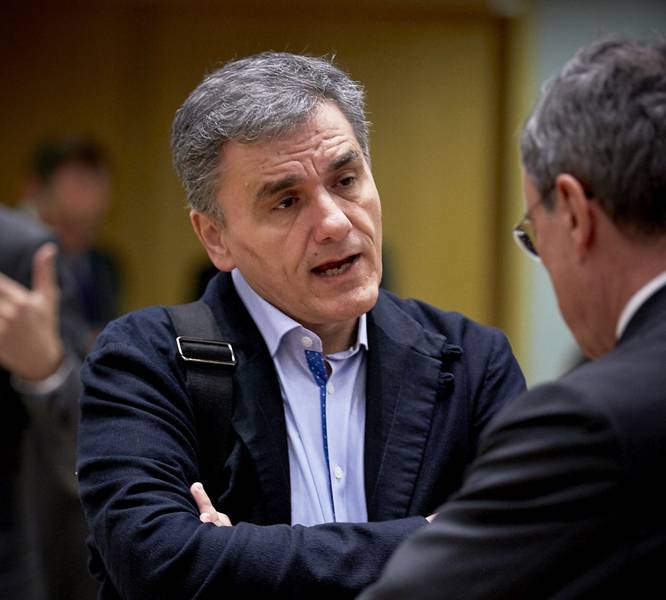Has Greece Grown Up?
Adelina Marini, December 11, 2017
 The year-end is usually time for taking stock, and the change of guard in a key euro area institution is a reason for even deeper analyses and even for a book. Not to mention the deepest euro area crisis since the introduction of the single currency. During the farewell with Eurogroup chief Jeroen Dijsselbloem (The Netherlands, S&D) at the last meeting of the euro area finance minsters on 4 December, it was hinted that he should write a book to tell about the most crucial moments of his 5-year presidency.
The year-end is usually time for taking stock, and the change of guard in a key euro area institution is a reason for even deeper analyses and even for a book. Not to mention the deepest euro area crisis since the introduction of the single currency. During the farewell with Eurogroup chief Jeroen Dijsselbloem (The Netherlands, S&D) at the last meeting of the euro area finance minsters on 4 December, it was hinted that he should write a book to tell about the most crucial moments of his 5-year presidency.
He did not take the bait but, instead, Economic and Finance Commissioner Pierre Moscovici (France, S&D) ran high. According to him, not one but several books have to be written, and these books have to be different than those written by the unfortunate former Greek finance minister Yanis Varoufakis. Pierre Moscovici called one of Mr Varoufakis's latest books, Adults in the Room, "more like fairy tales" and added that someone should write an adult story without the paranoia and the weird ideas.
"There will be a lot of books establishing the truth, what was really done by the real players, finding real solutions through real compromise", also said Mr Moscovici, thus making the shortest stock-taking of one of the most tumultuous periods of the Greek drama. And this drama is now drawing to an end, its conclusions revealing that the Greek authorities have most likely left the fairy world and become "real" members of the most serious adults' club in the EU - the eurozone. One of the most important news at the December Eurogroup meeting was that the third review of the third bailout programme is almost complete. Moreover, it is possible that there will be only one more programme review, or two. This will be decided at the January 22 meeting, which will be a debut for the new Eurogroup president Mario Centeno.
The next prior actions have been agreed, a large part of which the Greek government committed to implement by Christmas and the rest right at the beginning of the New Year to allow the institutions to complete their report which will serve as a basis for the Eurogroup to officially unlock the disbursement of the next tranche. Among the measures are Greece to exceed this year's budget primary surplus target of 1.75% of GDP by a wide margin. Then, an agreement was reached on the 2018 budget which allows Greece to achieve a 3.5% primary budget surplus. The other agreed measures are maintaining financial stability, improving the business environment, the investment climate, and reforms of the energy sector. Modernisation of the public administration continues to be on the agenda.
"Very good news, it's been a hard work and it shows commitment from all sides", announced President Dijsselbloem. And Commissioner Pierre Moscovici even stated that for the first time the process is finished so smoothly and swiftly. The highest evaluation, however, came from the head of the European Stability Mechanism (the permanent bailout fund of the eurozone), Klaus Regling, who sees behind the Greek success what was lacking during all these eight years since the beginning of the Greek crisis - the so called ownership of reforms. This means governments to stop viewing reforms as imposed from outside but as something that stems from themselves as solutions to severe structural problems. The so called ownership of reforms is the equivalent of the famous political will which the European Commission has been looking for so long for in the implementation of the Bulgarian commitments under the Cooperation and Verification Mechanism, and is still seeking in the candidate countries.
 To reward Greece's good behaviour a little while before St. Nicholas day and before Christmas, Santa Klaus Regling opened the bag with presents. He announced the results of the implementation of the short-term market-based debt measures. The implementation exceeded the expectations the ESM had when the measures were adopted earlier this year. According to them, the public debt-to-GDP ratio has to be reduced by 20 percentage points by 2060. The results show, however, that there will be an improvement of 25 percentage points, and the gross financial needs-to-GDP ratio will decline by around 6 percentage points (with 15 percentage points of GDP agreed). This, according to Mr Regling, will have a very good effect on the sustainability of the Greek debt, although he admitted that nothing has changed regarding the mid-term and long-term measures.
To reward Greece's good behaviour a little while before St. Nicholas day and before Christmas, Santa Klaus Regling opened the bag with presents. He announced the results of the implementation of the short-term market-based debt measures. The implementation exceeded the expectations the ESM had when the measures were adopted earlier this year. According to them, the public debt-to-GDP ratio has to be reduced by 20 percentage points by 2060. The results show, however, that there will be an improvement of 25 percentage points, and the gross financial needs-to-GDP ratio will decline by around 6 percentage points (with 15 percentage points of GDP agreed). This, according to Mr Regling, will have a very good effect on the sustainability of the Greek debt, although he admitted that nothing has changed regarding the mid-term and long-term measures.
What are the short-term debt measures?
They are three sets: smoothing Greece's repayment profile; reducing Greece's interest rate risk; waiving the step-up interest rate margin for 2017. The first measure is related only to the second bailout programme for Greece, financed by the temporary bailout fund EFSF. The maximum weighted average maturity of the loans in this programme was agreed to be 32.5 years. In February 2015, the maturity dropped at 28 years, due to various factors, and was again raised at 32.5 years. In the meantime, the repayment was reprofiled to avoid the accumulation of maturities in the 2030s and the 2040s.
The second set of measures is related to the loans Greece received to recapitalise its banks, worth 42.7 bn euros. However, these loans were not paid in cash but in the form of floating-rates notes. The ESM is currently exchanging these notes for fixed-rate notes which it is then buying back for cash. This scheme significantly reduces Greece's interest rate risk. The ESM has managed to raise all the funds that are needed for the bond exchange through issuing longer-dated bonds. Under the third sceheme, the ESM is charging fixed rates on part of the future tranches for Greece. This scheme will be applied as of next year.
The ESM warns, however, that the consequences of these schemes are not entirely under its control. In case costs emerge they will be covered by Greece but will be entirely or even more than well compensated in the long-run.
Jeroen Dijsselbloem's stock-taking
The outgoing Eurogroup president, who was one of the main players in the Greek drama in the past five years, put Greece on the second place when remembering the toughest moments in his presidency. During his last hearing in the economic committee of the European Parliament, he praised Greece for the impressive and large-scale reforms, covering areas such as public finances, public administration, the social welfare system, the labour and product markets. In the same time, he recalled that a lot more work needs to be done. However, Greece has turned the page not only politically but economically as well. This is thanks to a long and painful process of rescue, during which a lot of mistakes were made by all sides.
Jeroen Dijsselbloem said that before the crisis a lot of mistakes were made and bad decisions were taken which led to risk accumulation, overcrediting of the economy, non-productive investments were made. Mistakes were made, however, by the European institutions as well. The most fundamental of them was bailing out the Greek banks and investors. This was an expensive and inefficient operation, Mr Dijsselbloem added but explained that circumstances were very tough back then and probably there was no other way to respond. Too many improvisations were made during the drafting of the first adjustment  programmes, he said. The Eurogroup head hoped that Greek politicians are at least as critical to the decisions taken in the past as he is toward decisions of the institutions.
programmes, he said. The Eurogroup head hoped that Greek politicians are at least as critical to the decisions taken in the past as he is toward decisions of the institutions.
After the end of the meeting, the Greek Finance Minister Euclid Tsakalotos was very happy most of all with the good reactions of the institutions. His assessment was also that Greece is turning the corner and this is accepted by everyone. His expectations are that the 22 January meeting will be even better. Greece's third bailout programme is expiring in August 2018. What future awaits the country after that you can read here.
In its autumn forecast, the Commission expects enhanced economic recovery in Greece. The Commission forecasts the economic growth this year to be 1.6%, and next year and in 2019 - 2.5%. The Commission's assessment is that the Greek labour market is swiftly recovering and unemployment is expected to drop to 21.8% this year, 20.4% next year and down to 18.7% in 2019. Public debt can fall to 177.8% of GDP next year and to 170.1% in 2019 if everything goes according to the plan. This is a significant improvement compared to the Commission spring economic forecast. The only downside risks the Commission sees in the autumn forecast are that it is based on full implementation of the agreed measures. This is a hint that the rosy picture is created with the expectation that the Greek authorities will not become complacent now that the end is near.
The end of Greece's rescue operation will close one of the darkest chapters in the history of the eurozone quite on time before the beginning of a new process of deepening of the integration in the euro area at that, which will require a much higher level of trust among the 19 members of a club of adults sharing a common currency. The most important lesson from this crisis is that populism costs dearly and that structural problems have neither easy nor left or right solutions.
 Klaus Regling | © Council of the EU
Klaus Regling | © Council of the EU Mario Centeno | © Council of the EU
Mario Centeno | © Council of the EU Mario Centeno | © Council of the EU
Mario Centeno | © Council of the EU